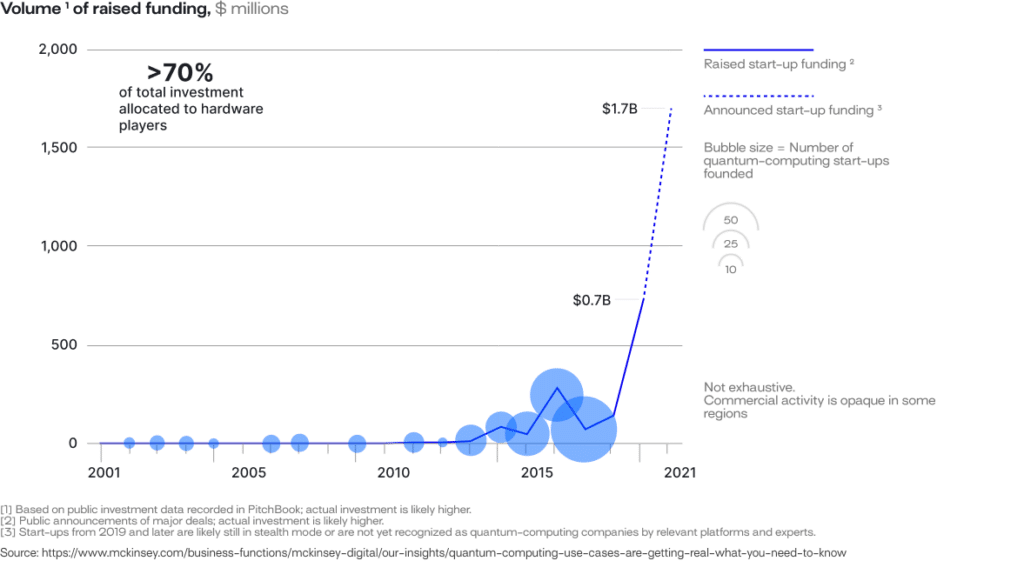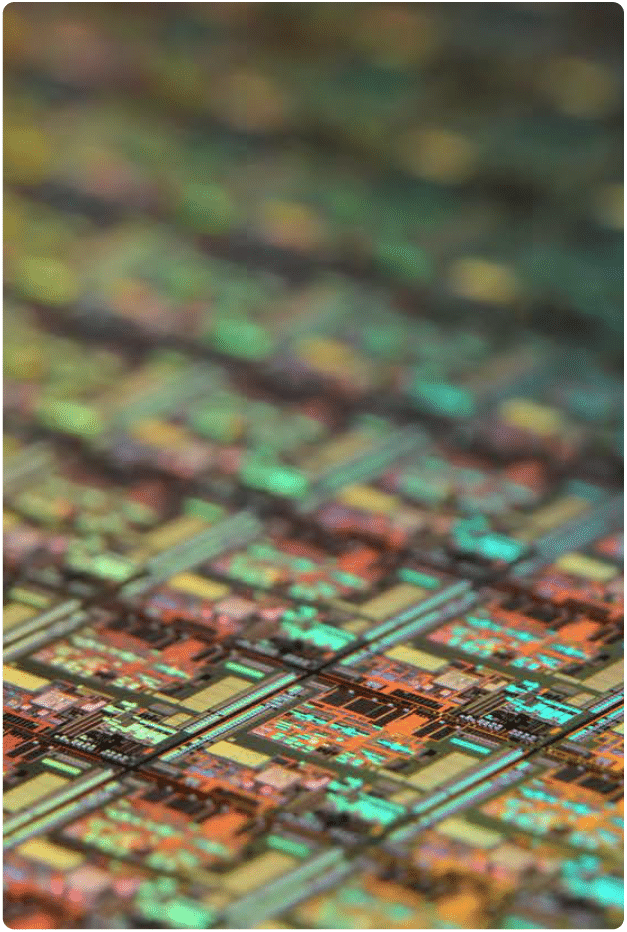29th Apr 2022
Quantum Computing (QC) describes the next generation of computing innovation, which could in turn support transformative scope and capacity changes in Machine Learning (ML) and Artificial Intelligence (AI).
QC harnesses the peculiar properties of subatomic particles at sub-Kelvin temperatures to perform certain kinds of calculations exponentially faster than any traditional computer is capable of. They are not just faster than binary digital electronic (traditional) computers, they process information in a radically different manner and therefore have the potential to explore big data in ways that have not been possible until now. Innovation in QC is directly linked to developments in ML, which relies upon machines gathering, absorbing and optimizing vast amounts of data. QC also synergizes with OpenAI, which often hits computing barriers because the datasets involved are enormous and AI algorithms are incredibly complex, requiring massive amounts of compute power which traditional computers can’t always provide.[1]
Companies leading the research, development and commercialization of QC include Google, Microsoft, IBM, Intel, Honeywell, IonQ, D-Wave and Regetti Computing
Governments, financial services companies, international retail firms and defense establishments have all joined tech giants IBM, Google and Microsoft in recognizing and investing in the potential of QC. CB Insights reported a 500% rise in venture capital funding in the quantum space between 2015 and 2020[2] While D-Wave offered the first commercially available QC in 2011, frontrunners such as Google and Microsoft have mainly concentrated on providing cloud access to their nascent QCs.
IBM were the first to make their 5 qubit QC available on the cloud in 2016 (a qubit is the basic unit of quantum information—the quantum version of the classical binary bit), in order to allow researchers to work collaboratively to advance a breakthrough in this cutting-edge field. IBM have since built a community of over 260,000 registered users who now have access to their latest 127 qubit processor, and who run more than one billion actions every day on real hardware and simulators. In May 2021 Google made a multi-billion dollar commitment to building an error-corrected, useful QC by 2029.[3] Meanwhile IonQ, D-Wave and others also offer cloud access to their quantum processors, and Alibaba, Amazon and Microsoft have launched commercial quantum-computing cloud services; all this promotes access to drive the expansion of use-cases and applications.
The evolution of QC and its applications have been analogized to that of the PC, whose development and full functionality were not predicted when it was first developed.[4] QC’s potential to enhance machine learning and AI functionality support near-term utilization predictions in drug discovery, the optimization of complex systems, risk management, retail, cyber security, materials science, defense, energy, and logistics.
Sectors spearheading experimentation with potential use cases are primarily manufacturing, financial services, and security industries
For current performance and holdings, please visit defianceetfs.com/QTUM. The companies referenced in the communication are not affiliated with Defiance ; however, over time the companies may be held in the QTUM portfolio.
What are Quantum Computers?
Quantum Computers (QCs) are currently incredibly large machines that are highly sensitive to electrical, magnetic and thermal “noise” – they therefore require their own room to ensure proper operational conditions. (The commercially available D-wave QC is housed in a 10 foot tall container. The image shows a non-insulated or cooled QC that would not actually function due to the conditions).

The Science
QCs exploit certain physical phenomena – superposition, entanglement, and interference – to store and manipulate information in devices called qubits. Qubits are typically unstable and perishable- they maintain their state for around 50 microseconds before errors creep in.
Superposition refers to the combination of states that would usually be described independently. To explain this by analogy: if you play two musical notes at once, you hear the superposition of the two notes.
Entanglement is a highly counter-intuitive quantum phenomenon describing behavior that is not classically logical or observable in the perceivable physical world. Entangled particles behave together as a system so that a change to one influences the other, even if the two particles are physically distant from each other.
Quantum interference can be understood similarly to wave interference; when two waves are in phase, their amplitudes add, and when they are out of phase, their amplitudes cancel.
Quantum Computing takes advantage of quantum mechanics rather than electrical conductivity (as in classical computers). While the latter hold information in bits (short for binary digits – these can be either 0 or 1) and perform calculations using circuits that implement Boolean algebra (the logic of true/ false, and/or); QCs exploit the behavior of subatomic particles such as electrons and photons, which can exist in multiple distinct states simultaneously (imagine 0 and 1 at the same time) and whose states can be described only probabilistically using complex numbers. QC’s use linear algebra to manipulate matrices of complex numbers and unlike classical computers that must consider possibilities one at a time, they can consider all outcomes at the same time.
For example, a classical search algorithm would require 5 million attempts to find a phone number in a phone book of 10 million entries; a QC algorithm could do it in just 1,000 operations – 5,000 times faster.
In October 2019 Google officially announced that it had achieved “Quantum Supremacy,” with its 54 qubit QC Sycamore apparently solving a mathematical calculation in 200 seconds that would take a supercomputer 10,000 years.[5] IBM quickly countered that Google’s claim was exaggerated, and that the world’s most powerful classical computer, the Summit OLCF-4 at Oak Ridge National Laboratory, could have performed the same calculation in 2.5 days. The announcement however, did raise awareness of quantum computing as something with commercial applications that was no longer a far off academic dream. The focus now is on quantum advantage (rather than supremacy), the point at which quantum applications deliver significant advantages over classical computers.
Where do we stand?
Start-up activity and investments in quantum computing have skyrocketed since 2015.

As of this writing the following stocks mentioned are current holding of Defiance’s ETF, QTUM: Advanced Micro Devices, Inc., Alphabet Inc, Microsoft Corp, International Business Machs Com, Intel Corp, Honeywell Intl Inc, Ionq Inc, Nvidia Corp., Rigetti Computing Inc, Hewlett Packard Enterprise Co Com, Nokia Corp, Raytheon Technologies Corp, Alibaba Group Hldg Ltd, Lockheed Martin Corp.

Since then progress has been rapid. Quantum start-up ventures have mushroomed and 2 quantum companies went public via SPACs in October 2021 (Rigetti and IonQ) as governments, industry and capital recognize the potential. June 2021 saw a $250 bn Senate Bill passed to assert the US’s quantum competitiveness with respect to China’s considerable investment in the field and a new UK-US- Australia pact focused on quantum advantage for security needs.
Commercial and industrial potential rises as the number of logical qubits increases and error rates come down. While many use-cases are still unknown to us, it will likely not be too long before QC brings transformative changes in two key areas: 1)encryption, digital privacy and security, and 2)algorithmic capacity (machine learning), paving the way for unprecedented problem solving with potentially profound implications for academia, industry, defense and other areas. [6]
Whether “supreme” or simply “super”, Google’s Sycamore QC announcement reminds us of the future of computing
What is machine learning?
Machine Learning is a subset of Artificial Intelligence, which is the science of training machines to perform human tasks. ML is critically important in this endeavor (and others) in that it is responsible for cultivating the machine’s learning capability by looking at patterns and drawing conclusions. ML refers to the cycle of asking a question, gathering data relevant to that question, designing an algorithm, testing that algorithm, collecting feedback, using the feedback to refine the algorithm and thereby improving performance.
The aim of ML is to develop continually improving machines that evolve with the data to produce reliable and repeatable decisions. The need for human interaction is steadily reduced as highly sophisticated, evolving algorithms are continually refined until they come to reflect human thought processes as closely as possible. ML is the tool to leverage vast amount of data to support enhanced, informed decision-making, improved AI capabilities, accelerated business intelligence, and increased productivity and efficiency. Examples of ML already in use are recommendations made by online retail services (Amazon) or automatic credit ratings; but when combined with the potential achievement of quantum computing, the scope for other applications is vast.

Quantum Computing and Machine Learning applications
QC capability and ML advances will not only accelerate the processing of data, they could allow businesses, industries and governments to reconceptualize analytic workloads, pursue new strategies and tackle new challenges. The earliest applications, some of which are already being developed, will most likely be in computationally intensive problems in finance, risk management, cybersecurity, materials science, energy, and logistics. These fields stand to benefit most from the simulation, optimization and sampling breakthroughs that QC may bring.

- Open AI and other AI applications need the compute power that quantum computing can deliver, while AI problem-solving can potentially help quantum computing surmount some of the obstacles to success. Research and Markets suggests that “Quantum computing and AI are highly synergistic with one another as the former speeds up problem solving for the latter, and the latter provides an automated learning structure for the former. AI may at some point overcome current hardware-centric limitations of quantum computing.”[7]
- Governments hold vast amounts of data, for example relating to utilities and public safety. Quantum methods could analyze and exploit this data more efficiently to increase efficiency, reduce costs and improve standards of living. In 2022 UK Ministry of Defence (MoD) invested in its first quantum computer.
- Aerospace and Defense establishments could benefit from QC advances through early adoption of more sophisticated computers and sensors to imaging technology and cybersecurity.
- Cryptography – QCs will be able to decode classically encrypted data. Hence companies and governments are already working to develop new quantum-based information-technology infrastructures to ensure that communications, banking and defense will remain secure in a quantum era.
- Financial service companies could use QC to identify insights in data and balance many competing factors for portfolio optimization (selecting assets and minimizing transaction costs) or algorithmic trading, asset pricing, capital project budgeting, data security, underwriting and credit scoring and fraud prevention.
- Healthcare – thanks to personal devices that collect increasing amounts of information on individuals, QCs could spearhead the provision of personalized medicine. Drug discovery could also be enhanced by QC’s ability to analyze and optimize unprecedented amounts of complex information on the human genome and properties of the natural world.
- Retail – QC could transform retail in its ability to analyze buying history, make suggestions, optimize pricing and personalize the shopping experience. It could refine online recommendations and bidding strategies for advertisements using optimization algorithms to respond in the most effective way to consumers’ needs and changing markets
- Oil and Gas industries could be enhanced through a QC contribution to the analysis of minerals in the ground to help find new energy sources, predict refinery sensor failures, and streamline oil distribution to make it more efficient and cost-effective.
- Transportation and logistics could see wide applications of QC and ML technology – from the much-hyped self-driving car (the epitome of ML success in which the car “learns” to respond as a human would) to route-planning and optimization or flight-scheduling
- Materials Scientists could use QC to help design new materials and industrial processes by precisely predicting the behavior of molecules. QCs could conduct chemistry simulations to improve batteries for electric vehicles or to develop new pharmaceuticals. They could synthesize the nitrogen reaction that makes fertilizer (and currently depletes the worlds’ natural gas reserves); or make robotics more effective.

By the Numbers:
Quantum Computing, Machine Learning and AI Global Value Chain
QCs are not positioned to replace smart phones and laptops. Rather by 2030 it has been suggested that the technology supporting these and other devices will regularly be using QC accessed via the cloud, and that the market will continue to develop into the 2030s. The application of QC is already evident in optimization, chemistry and material sciences, and encryption.
- According to reports, 91% of global business leaders are investing or planning to invest in quantum computing; 70% are developing real-life use cases and 61% are planning to spend $1 million or more over the next three years.[8]
- Global spending on AI-centric systems is forecasted to surpass $300 billion by 2026.[9]
- The global ML market was valued at $15.5 bn in 2021 and will grow at a CAGR of 38.6% between 2021 and 2028.[10]
- About 92% of large companies are achieving returns on their investments in artificial intelligence, and the same percentage are increasing their AI investment.[11]

Specialists in this field suggest a strong future global market for QC hardware, separate from the software and services enabled by it. While QCs likely won’t be superior to PCs in many areas, the niche for QC’s contribution could become roughly equivalent to the contemporary supercomputer market (which also consists of large, nonportable million-dollar devices that are only capable of solving certain problems), which in 2023 was worth approximately $7bn with a projected CAGR of 10%.[12]
Catalysts for Growth
Deloitte has found that VCs invested more than US $1bn in QC in 2021, 68% more than the previous year, and global governments more than US $5 bn.[13] Other data reveals the steady growth expected in the ML sphere, with its global CAGR at about 42%, and its value is anticipated to reach almost $9 billion in 2022.[14]
The IDC predicts that investment in quantum computing will continue at a CAGR of 11.3% for the next 6 years, reaching almost $16.4 billion by 2027 [15]. In 2022, Origin – Chinese based developer of quantum software, cloud and controlling hardware – secured the largest cash injection of the QC industry that year – over $148m in Series B funding. IQM raised $130m to tackle the climate crisis and Xanadu closed $100m for photonic technology.[16] These are just a selection of the significant investments being targeted towards quantum computing.
Major companies have become quantum stock picks as they recognize and invest in the QC/AI/ML future. In January 2023, Microsoft announced an expansion of its partnership with OpenAI , the company that created ChatGPT and is funded in part by Microsoft. This is the third phase of the partnership between the two companies, and it will focus on three key areas: supercomputing at scale, new AI-powered experiences, and becoming the exclusive cloud provider for OpenAI workloads through its Azure platform. Not to be outdone by Microsoft, Google announced its own generative AI chatbot, Bard, in February 2023.[17] Nvidia is producing the infrastructure that makes many types of AI possible—AI chips. These chips boast high bandwidth memory, fast computation, and parallel processing designed to support deep learning applications and are used in supercomputers, data centers, crypto mining, and even in self-driving electric cars. In January 2023 AMD signaled its commitment to the AI race when it unveiled a series of x86-based chips that it claims are the first to contain an on-board dedicated AI engine. [18]
In our view this level of investment, combined with evidence of real progress from the scientists and considerable commitment among potential industrial and commercial operators, reflects significant market confidence in the future value of QC and ML.

QC into the future
While there is still a lot of fundamental science to be worked out and commercializing that science will take time, there is clear market confidence, resolution and investment on the part of the major scientific, industrial, governmental and commercial interests.[19] Analysts understand the QC market to be following Moore’s Law or even the more rapid Neven’s Laws, which forecasts historical trends in technological and social change, productivity, and economic growth.[20] These Laws anticipate a continual series of performance improvements and declining costs in the market, just as occurred with classical computers in their earliest phases of innovation and development.[21] According to this model, future stages of QC development will require scientific breakthroughs in the capacity, stability, and reliability of qubits and the programming and refinement of an environment that allows non-experts to interact with the technology. These developments are already playing out, with Strangeworks, an Austin USA-based start-up developing tools to ease researchers’ transition from classical to quantum computing[22] and IBM reporting and anticipating even more advances in quantum volume.[23]
Defiance Next Gen Computing ETF- QTUM provides exposure to companies on the forefront of transformative computing technologies including quantum computing, machine learning, super computing, artificial intelligence, cloud computing and other disruptive technologies.
QTUM:
- Offers investors liquid, transparent and low-cost access to companies developing and applying Quantum Computing, Machine Learning and other transformative computing technologies.[24]
- Tracks globally-listed stocks across all market capitalizations, using the BlueStar Quantum Computing and Machine Learning Index (BQTUM) *
- Incorporates an equal weight methodology which offers investors more precise exposure, including to smaller companies with more potential for growth.[25]

[1] “What has quantum computing got to do with AI?” July 25 ,2022. https://www.verdict.co.uk/what-has-quantum-computing-got-to-do-with-ai/
[2] “What Is Quantum Computing? Definition, Industry Trends, & Benefits Explained,” January 7, 2021. https://www.cbinsights.com/research/report/quantum-computing/
[3] “Google wants to build a useful quantum computer by 2029,” Jon Porter, May 19, 2021 https://www.theverge.com/2021/5/19/22443453/google-quantum-computer-2029-decade-commercial-useful-qubits-quantum-transistor
[4] “ITIF Technology Explainer: What Is Quantum Computing?” 20 September, 2018, https://itif.org/publications/2018/09/20/itif-technology-explainer-what-quantum-computing
[5] Arthur Herman, “The Quantum Computing Threat to American Security,” Wall Street Journal, November 10, 2019. https://www.wsj.com/articles/the-quantum-computing-threat-to-american-security-11573411715?yptr=yahoo
[6] “Quantum Computing for Business Leaders: Will the reality live up to the hype?” Jonathan Ruane, Andrew McAfee, and William D. Oliver, January–February 2022. https://hbr.org/2022/01/quantum-computing-for-business-leaders
[7] “Quantum Intelligence: Quantum Computing and Artificial Intelligence 2018 – 2023” December 2018 https://www.researchandmarkets.com/reports/4704016/quantum-intelligence-quantum-computing-and
[8] https://venturebeat.com/data-infrastructure/2023-could-be-the-breakthrough-year-for-quantum-computing/
[9] “Worldwide Spending on AI-Centric Systems Will Pass $300 Billion by 2026, According to IDC,” September 12, 2022 at https://www.idc.com/getdoc.jsp?containerId=prUS49670322
[10] https://www.fortunebusinessinsights.com/machine-learning-market-102226
[11] https://mitsloan.mit.edu/ideas-made-to-matter/artificial-intelligence-pays-when-businesses-go-all
[12] https://www.factmr.com/report/supercomputer-market
[13] https://www2.deloitte.com/us/en/insights/industry/technology/technology-media-and-telecom-predictions/2022/future-of-quantum-computing.html
[14] https://www.zippia.com/advice/machine-learning-statistics/
[15] “IDC Forecasts Worldwide Quantum Computing Market to Grow to $8.6 Billion in 2027” November 29, 2021 https://www.idc.com/getdoc.jsp?containerId=prUS48414121
[16] https://www.verdict.co.uk/what-the-10-biggest-deals-of-2022-tells-us-about-the-state-of-quantum-computing/
[17] “An important next step on our AI journey”, February 6, 2023, https://blog.google/technology/ai/bard-google-ai-search-updates/
[18] AMD doubles down on AI with new Ryzen 7000 chips, January 6, 2023. https://www.techtarget.com/searchenterpriseai/news/252528954/AMD-doubles-down-on-AI-with-new-Ryzen-7000-chips
[19] Paul Teich for Tirias Research, October 23, 2017, at https://www.forbes.com/sites/tiriasresearch/2017/10/23/quantum-will-not-break-encryption-yet/#2b4a01207319
[20] “ITIF Technology Explainer: What Is Quantum Computing?” September 20, 2018 at https://itif.org/publications/2018/09/20/itif-technology-explainer-what-quantum-computing
[21] “Counterpoint Global Insights: Quantum Computing,” Morgan Stanley, October 2020. https://www.morganstanley.com/im/publication/insights/articles/article_quantumcomputing_letter.pdf?1614770692612
[22] Strangeworks Company Website. https://strangeworks.com/
[23] https://research.ibm.com/blog/127-qubit-quantum-processor-eagle
[24] The possible applications of quantum computing are only in the exploration stages, and the possibility of returns is uncertain and may not be realized in the near future. QTUM’s gross expense ratio is 0.4%. Brokerage commissions will reduce returns.
[25] Index components are assigned an equal weight subject to a liquidity overlay, index components are reviewed semi-annually for eligibility, and the weights are reset accordingly. Fund holdings and sectors are subject to change at any time and should not be considered recommendations to buy or sell any security. See the list of the fund’s current top ten holdings.

